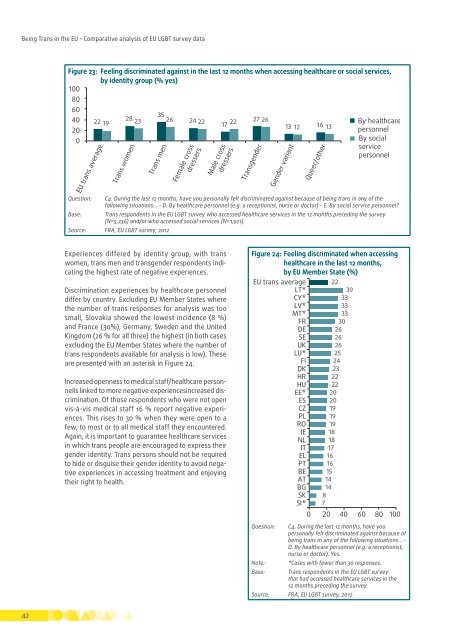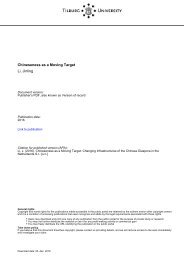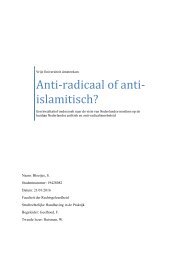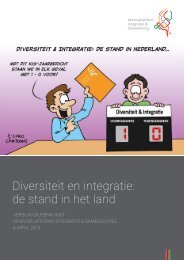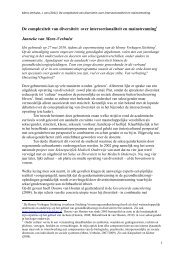fra-2014-being-trans-eu-comparative_en
fra-2014-being-trans-eu-comparative_en
fra-2014-being-trans-eu-comparative_en
You also want an ePaper? Increase the reach of your titles
YUMPU automatically turns print PDFs into web optimized ePapers that Google loves.
Being Trans in the EU – Comparative analysis of EU LGBT survey dataFigure 23: Feeling discriminated against in the last 12 months wh<strong>en</strong> accessing healthcare or social services,by id<strong>en</strong>tity group (% yes)100806040200352822242719 23 26 221722 26EU <strong>trans</strong> averageTrans wom<strong>en</strong>Trans m<strong>en</strong>Female crossdressersMale crossdressersTransg<strong>en</strong>der13 12 16 13G<strong>en</strong>der variantQueer/otherBy healthcarepersonnelBy socialservicepersonnelQuestion: C4. During the last 12 months, have you personally felt discriminated against because of <strong>being</strong> <strong>trans</strong> in any of thefollowing situations:.. - D. By healthcare personnel (e.g. a receptionist, nurse or doctor) - E. By social service personnel?Base: Trans respond<strong>en</strong>ts in the EU LGBT survey who accessed healthcare services in the 12 months preceding the survey(N=5,236) and/or who accessed social services (N=1,921).Source: FRA, EU LGBT survey, 2012Experi<strong>en</strong>ces differed by id<strong>en</strong>tity group, with <strong>trans</strong>wom<strong>en</strong>, <strong>trans</strong> m<strong>en</strong> and <strong>trans</strong>g<strong>en</strong>der respond<strong>en</strong>ts indicatingthe highest rate of negative experi<strong>en</strong>ces.Discrimination experi<strong>en</strong>ces by healthcare personneldiffer by country. Excluding EU Member States wherethe number of <strong>trans</strong> responses for analysis was toosmall, Slovakia showed the lowest incid<strong>en</strong>ce (8 %)and France (30%), Germany, Swed<strong>en</strong> and the UnitedKingdom (26 % for all three) the highest (in both casesexcluding the EU Member States where the number of<strong>trans</strong> respond<strong>en</strong>ts available for analysis is low). Theseare pres<strong>en</strong>ted with an asterisk in Figure 24.Increased op<strong>en</strong>ness to medical staff/healthcare personnelislinked to more negative experi<strong>en</strong>cesincreased discrimination.Of those respond<strong>en</strong>ts who were not op<strong>en</strong>vis-à-vis medical staff 16 % report negative experi<strong>en</strong>ces.This rises to 30 % wh<strong>en</strong> they were op<strong>en</strong> to afew, to most or to all medical staff they <strong>en</strong>countered.Again, it is important to guarantee healthcare servicesin which <strong>trans</strong> people are <strong>en</strong>couraged to express theirg<strong>en</strong>der id<strong>en</strong>tity. Trans persons should not be requiredto hide or disguise their g<strong>en</strong>der id<strong>en</strong>tity to avoid negativeexperi<strong>en</strong>ces in accessing treatm<strong>en</strong>t and <strong>en</strong>joyingtheir right to health.Figure 24: Feeling discriminated wh<strong>en</strong> accessinghealthcare in the last 12 months,by EU Member State (%)EU <strong>trans</strong> average 22LT*CY*LV*MT*FRDESEUKLU*FIDKHRHUEE*ESCZPLROIENLITELPTBEATBGSKSI*3933333330262626252423222220201919191818171616151414870 20 40 60 80 100Question: C4. During the last 12 months, have youpersonally felt discriminated against because of<strong>being</strong> <strong>trans</strong> in any of the following situations:.. -D. By healthcare personnel (e.g. a receptionist,nurse or doctor). Yes.Note: *Cases with fewer than 30 responses.Base: Trans respond<strong>en</strong>ts in the EU LGBT surveythat had accessed healthcare services in the12 months preceding the survey.Source: FRA, EU LGBT survey, 201242


